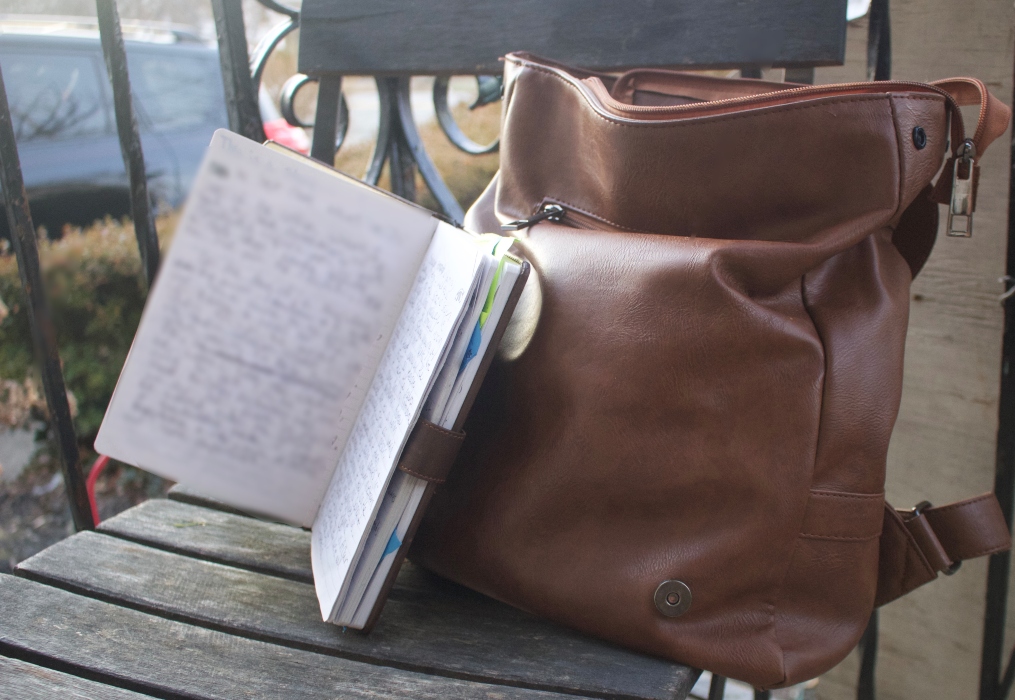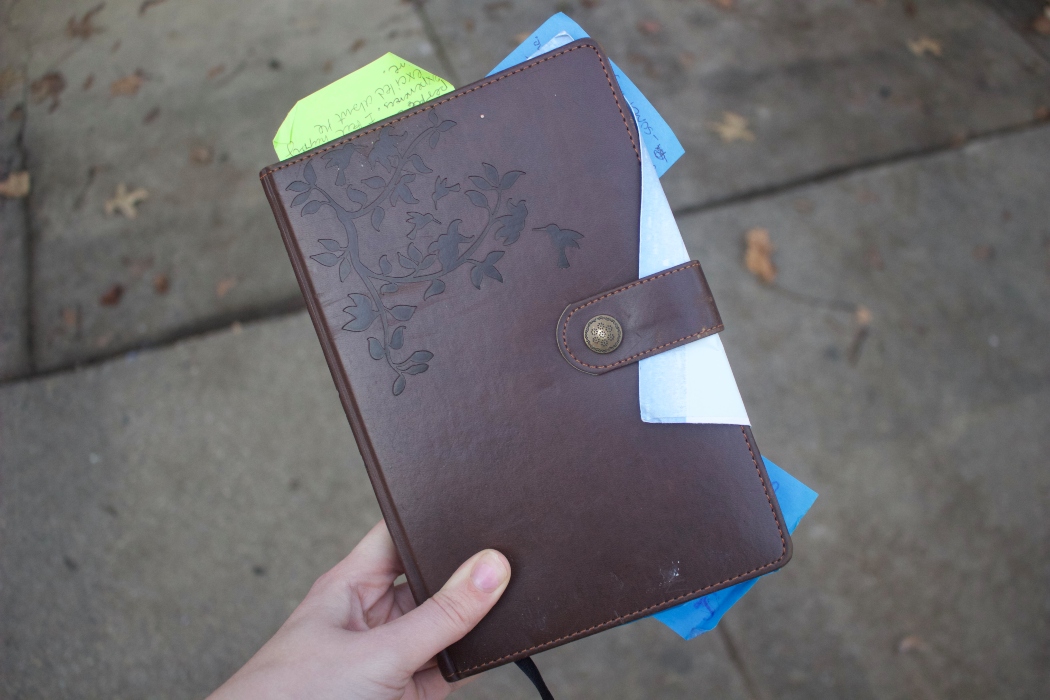
by Isabelle Rosini (B.A. English '20)
In my backpack, I will always have three things: wallet, pen, notebook. Even if I empty everything else out of my backpack for a trip or day out in town, these three things always remain safely, though somewhat haphazardly, tucked away in my bag.
Now, let me rearrange these three objects in order of importance to me:
1. Notebook
2. Pen
3. Wallet
Aside from its important job of holding my license, do I even have to explain why wallet is at the bottom of the list? Hint: I am a college student.I briefly contemplated placing pen at the top of the list, right before notebook. I then reasoned that the likelihood of being able to bum a pen, should inspiration strike, is higher than the chance that someone, probably a stranger, would be willing to lend me a notebook or a piece of paper. Of course, I could always resort to writing on my hand or, should the muse choose to speak through me while I am out to dinner, on the back of some crumpled up napkins. Is this not how J.K. Rowling started writing Harry Potter?
I started carrying a notebook during my first year of college. Since then, I have filled up many notebooks, marking each one with an unsightly, lazy print that twists and turns, letters hurriedly bumping up against one another. When my hand begins to cramp, I look back upon a string of gapless notes and realize that I can barely decipher what I have just written. I have created a secret code that is only secret because no one else can, nor do I think would want to, take the time to read it.
The primary reason that I carry around a notebook and continue to furiously fill it with revelation is tied up with my desire to become a better writer. When I was younger, I thought that being a good writer was something innate. You either had the ability to write well or you did not. I believed that my writing abilities would improve and expand naturally with age, but only because I had already demonstrated an aptitude for writing. When I was a child, I would write for fun. As I entered into my preteen and teenage years, though, writing became an activity that I associated with school; consequently, I only wrote when I was prompted to do so for an assignment. Writing had lost its spice by the time I was eleven or twelve. And, aside from the occasional research paper or literary analysis, not much writing was required of me in previous classrooms. Until I entered college, and my perception of the purpose of writing began to shift, I would not recognize how grossly I had neglected to foster my writing skills. Instead, I had stored my writing tools away in a lofty tower, carefully taking them down only when I needed them and safely tucking them back in velvet chambers as soon as I had finished writing.
When I was made aware of how much writing is required by an English curriculum, along with the slew of liberal arts classes needed to complete my degree, I realized that I needed to bring writing down to earth somehow. I could no longer keep my tools locked away, hidden like a party trick that would lose its ability to impress or excite the more I exposed it to the open air. I needed to change my perception of writing ability as a fixed talent to one that has endless potential to grow and improve. The tools would have to get dirty and be ready to spring to action at any given moment; they could no longer be out of reach, neatly compartmentalized. Now, they would have to stay with me not just when I write, but when I do everything else. From their great tower the writing tools have made the descent into my shabby backpack, never to wander far off again. Life and writing would have to collide.

My second goal in using the notebook was to decompartmentalize the writing process and allow it to occupy a permanent space in my mind. In high school and for much of freshman year, writing was an activity that occurred only when particular conditions were in order. I knew that it was time to write when:
1. My feet were flat in front of me
2. Eyes firmly glued to a computer screen, a blank document staring back at me
3. Phone on airplane mode, tucked away in a drawer
4. Stress incurred by a fast-approaching deadline
5. Silence
A delicate balance of these factors comprised my perfect writing environment. Like all good things, though, perfection can never last. Twenty minutes into writing, my phone would be back in my hand, screensaver on the computer screen, and one leg up on the chair, knee drawn to my chest. In reality, I wrote distractedly and messily, in a hurry and tired, taking too many undeserved breaks. Furthermore, the hurried way in which I wrote never gave me time to properly reflect on why I was writing aside from meeting a deadline and receiving a decent grade. Once I handed in an assignment, I did not think about writing anymore until the next rubric was passed out in class. I soon realized that this method for writing could no longer fly in college. Professors do not coordinate due dates with each other, unfortunately, so I often found myself working on multiple writing assignments simultaneously. I could no longer turn off writing mode when I stepped away from the computer, so the writing process began to infiltrate my regular cycle of thoughts. Ideas for papers would enter my brain while I was on the metro or walking to class. Lest I neglect inspiration, I started to record these ideas in my notebook. I continued this habit, chewing over assignments in the shower or at the gym and writing down my thoughts, until I had effectively rejected the idea that writing can only occur under specific conditions. My notebook also became the place where I began to record feedback on assignments so that I could readily implement good things and eliminate bad things in future essays. Thanks to my notebook and change in perspective, every moment is now an opportunity to think about and allow the writing process to become more fluid, less daunting, and significant beyond the realm of academia.
Since the writing process has begun to permeate my everyday life, I have become a better thinker and a better talker. I less often lack the words to say what I mean and find that I have more clarity of thought. My notebook becomes messier but my head becomes clearer. The collision of life and writing, manifested in a notebook, turned out not to be a collision at all. Instead, the meeting of life and writing looks more like a merger--one that is not always peaceful or seamless, but involves various moving parts in constant communication, the flexibility to shift gears and adapt, and the readiness to react to unexpected stimulus. I have put my notebook through the wringer; it is disheveled and worn, no longer fit for the tower from which it came. But my notebook is filled with a different kind of treasure: the triumph of progress. Contained between two covers is knowledge that was once unknown to me. Pages once vacant now teem with revelation. And even still, my notebook remains to be filled.
A version of this essay was originally written in response to the "Literacy Autobiography" assignment for ENG 328: Writing Center Theory & Practice, Fall 2019.
